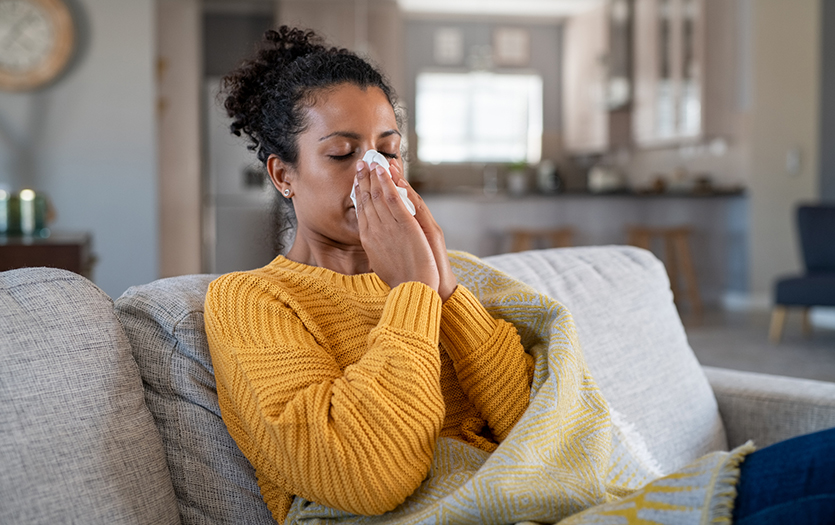
This post was written based on an appearance by Heather Willison, NP, PPG — Allergy, Asthma & Immunology, on the program PBS Healthline.
If you suffer from allergies, you may be wondering what you can do to find relief from the sneezing, itching and watery eyes. Whether you have seasonal allergies or experience them year-round, there are things you can try to help manage your symptoms. Here are some important questions you may have about allergies and how to get relief.
What are some over-the-counter treatment options?
There are a number of different allergy medications and products available for over-the-counter use, including:
- Antihistamines, which are medicines used to relieve allergy symptoms such as hives, itchy and watery eyes, and reactions to insect bites or stings. Be sure to check whether the antihistamine is sedating or non-sedating. It’s best to take sedating medication at night, as they will make you sleepy or drowsy.
- Nasal sprays, which deliver allergy medication directly into the lining of your nose to relieve sneezing, itching and runny nose. Nasal sprays are typically used daily and help people who have mild-to-moderate allergies.
- Nasal steroid sprays, which help shrink the swelling of your nasal passages to treat hay fever, nasal congestion, sneezing, post-nasal drip and more. These sprays need to be taken for 10 to 14 days before they begin working and should be used consistently after that for the most benefit.
- Saline nasal sprays, which rinse the nasal passages and keep the tissues in your nose from getting dry and irritated. Saline sprays can be used as symptoms occur, daily if needed.
Depending on your symptoms, you may want to try different approaches. However, it’s often recommended that a combination of antihistamines and nasal sprays is used to offer the most relief for many allergy sufferers.
Can kids use nasal sprays?
Kids can absolutely benefit from nasal sprays to help with their allergy symptoms. Always look for a nasal spray that is formulated for kids and consult with your healthcare provider before using. Once you have the go-ahead, you may be wondering the best way to get your child to use the spray without putting up a fight. Some good tips include:
- Letting them have control; give them the nasal spray so they can do it themselves.
- Show them how to angle the spray; it should be angled toward the OUTSIDE of each nostril.
- Have them take a small sniff; a large sniff isn’t necessary and can cause the spray to go into their throat.
Do you need a prescription nasal spray?
While there are some options for nasal sprays that you need a prescription for, most of them are not much stronger or more effective than the ones you can get over the counter. Talk with your healthcare provider if this is something you’d like to try.
What else can you do to stop or prevent allergy symptoms?
If you know that you suffer from allergies, it’s always a good idea to take some precautions after you’ve been exposed to potential allergens. For example, if you’re outside mowing and know that you are allergic to grass or pollen, you should come inside afterwards, take a shower, rinse your nasal passages with saline spray and change your clothes. The same thing applies for whatever allergen you’ve been around, such as mold or pet dander. The idea is to get all the allergen off your body and out of your nasal passages to try and stop any allergic reaction.
How can you tell if it’s allergies or sickness?
For some people, the symptoms of allergies can mirror those of a cold or other sickness. If you’re experiencing an itchy nose, eyes or throat, you probably have allergies and not a sickness. However, any sign of fever or body aches should be considered a sickness as allergies do not cause those symptoms.
Should you get an allergy shot?
If you’ve already tried over-the-counter medications and are frustrated because they don’t work for you, you may be a candidate for allergy shots or injections. Allergy shots are very effective at managing allergy symptoms for many people. They work by exposing you to certain allergens in order to de-sensitize you to them.
However, it’s important to understand that this type of medication is a big commitment. The process of de-sensitizing you to the allergen involves you receiving many injections over a fairly short period of time. Allergy shots must be administered weekly for 8 to 10 months, bi-weekly for six months and then every three to four weeks after that. In total, it’s a minimum of a three- to five-year commitment!
Can I be proactive with my allergy medication?
If you know that you suffer from seasonal allergies every year, it’s a good idea to be proactive and start taking your allergy medication BEFORE you notice symptoms. While some allergy medications can provide relief immediately, others like steroid nasal sprays need 10 to 14 days before they will be effective. The general rule of thumb for starting and stopping medications for seasonal allergies is:
- Spring allergies: Start taking medications March 15 and stop June 15.
- Fall allergies: Start taking medications August 15 and stop once there is a hard frost.
Although allergies can be burdensome, with the proper medications, you can find relief from your symptoms. If over-the-counter medications aren’t working for you, talk with your healthcare provider. One of Parkview’s Allergy, Asthma & Immunology experts can help you discover the right next steps for you, which may include allergy testing, allergy shots or other solutions. We have two practices in Fort Wayne. If you're interested in establishing care with one of our providers, call 260-425-6070, Monday - Friday from 8 a.m. - 5 p.m.




